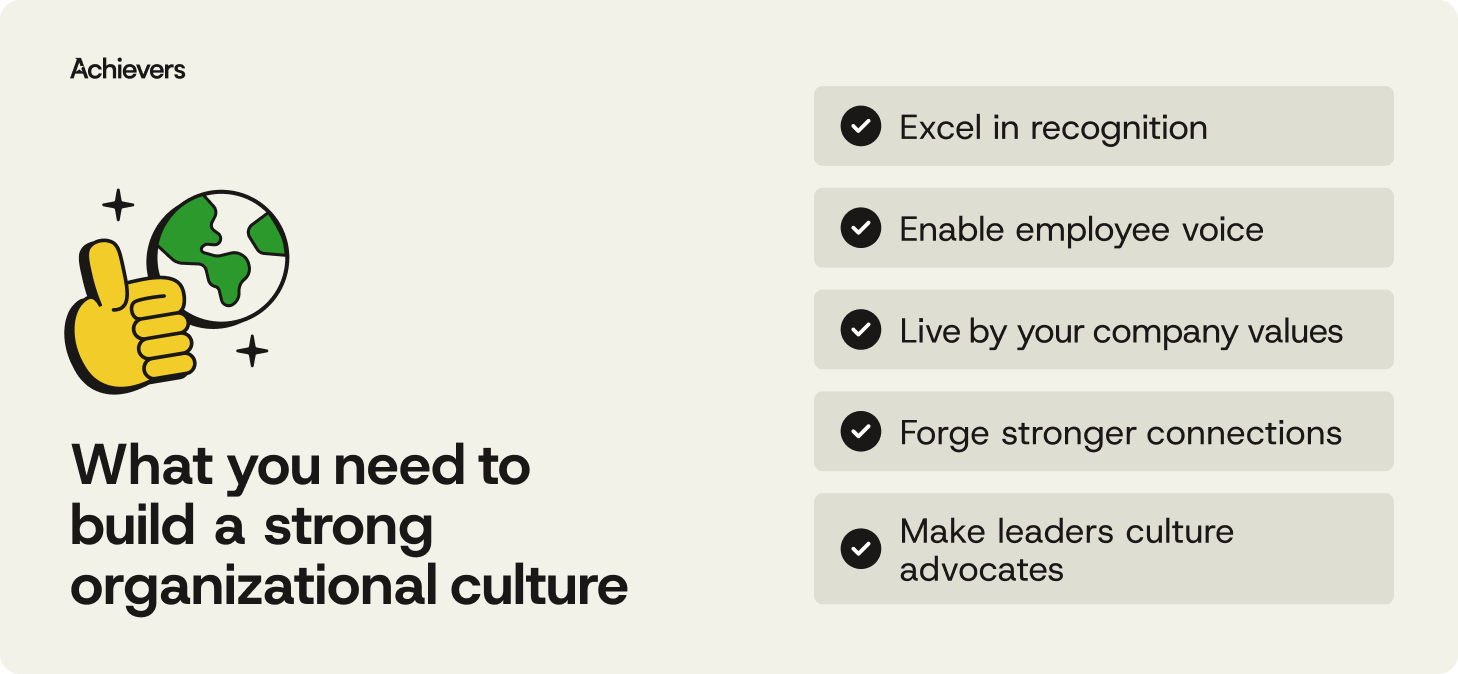Table of contents
Create a culture that means business™
Schedule a demo with an Achievers solution expert today.
Organizational culture gets a lot of airtime — for good reason. It’s not just posters on a wall or a few feel-good phrases in a handbook. Culture is how people behave when no one’s watching (and especially when everyone is). It shows up in the way teams collaborate, how leaders make decisions, and how employees feel about coming to work each day.
Get culture right, and you unlock the good stuff: stronger relationships, smarter decisions, faster innovation — and yes, better business results. Ignore it, and you’ll feel the ripple effects everywhere, from employee engagement to customer loyalty.
Culture isn’t your mission statement or your brand tagline. It’s not a PR strategy. It’s what happens in team meetings, in one-on-ones, and in those tricky moments when mistakes get made. It’s created by consistent, authentic actions — not corporate memos. And when it’s working, you won’t need to point to a poster to prove it.
In this blog, we’ll cut through the buzzwords to unpack what organizational culture really means, why it’s the backbone of high-performing companies, and how you can nurture it in real, tangible ways. Whether you’re fine-tuning your culture or building it from scratch, we’ll help you shape a workplace where people aren’t just working — they’re thriving.
The qualities that define exceptional organizational culture
High-performing cultures don’t just magically appear — they’re built, nurtured, and continuously reinforced. The best workplaces are shaped around a few key traits that turn good intentions into everyday actions. Here’s what separates thriving cultures from the ones that just make it onto a slide deck:
- Alignment with purpose: People want to know their work matters. When employees understand how their efforts tie back to company goals, motivation isn’t forced — it’s natural. Purpose gives everyone a reason to care (besides just meeting deadlines).
- A culture of appreciation: Frequent, meaningful recognition isn’t a nice-to-have — it’s how employees know they belong. Appreciation fuels engagement, strengthens connection, and, yes, it helps people perform better. Turns out a simple ‘thank you’ can go a long way.
- A foundation of trust: Trust isn’t built with empty promises. It’s built with action — consistent, honest, and transparent communication. When trust runs deep, collaboration and innovation follow. People show up at their best because they know their workplace has their back.
- A focus on performance: Great cultures aren’t just cozy — they’re driven. High-performing teams encourage each other to push boundaries, take smart risks, and celebrate wins (big or small). Success should feel both rewarding and repeatable.
- Built-in resilience: Change is inevitable. The best cultures don’t just survive change — they adapt and grow through it. They support employees through uncertainty and emerge stronger, not scattered.
- A team-first mindset: Teams that support each other succeed together. Collaboration, respect, and mutual accountability are the heartbeat of thriving organizations. Lone wolves need not apply.
- Integrity and transparency from the top: Leaders set the standard. When they lead with honesty and openness, it trickles down — building a culture people can trust and rally behind. No smoke, no mirrors, just real leadership.
- A spirit of innovation: Innovation isn’t reserved for product teams. Cultures that encourage fresh thinking solve problems faster, work smarter, and stay ahead of the curve — even when the curve takes a sharp turn.
- Psychological safety: The best ideas often start with a raised hand. People should feel safe to speak up, challenge the status quo, and share bold ideas — without fear of being shut down. That’s where real growth happens.
How to build that culture — 10 steps to make it real
Knowing what great organizational culture looks like is one thing. Building it? That’s where the real work — and the real payoff — begins. Here’s how to turn culture talk into culture action:

1. Excel in recognition
Recognition isn’t just a pat on the back after five years of service. It’s a daily, meaningful exchange that shows employees they matter. When recognition becomes part of the everyday rhythm of work, it strengthens connection, boosts engagement, and drives performance. People are wired to do more of what gets noticed — so make it easy for everyone, from managers to peers, to celebrate each other often. Employee recognition isn’t extra credit; it’s the baseline for a culture where people feel seen, heard, and appreciated.
2. Enable employee voice
Your people have ideas — smart, valuable ideas. That’s the power of employee voice. The real magic happens when you don’t just listen, but act on what you hear. When employees see their voice driving real change, engagement rises, trust builds, and culture strengthens. Use surveys, open forums, and one-on-one conversations to amplify employee voice and stay connected to what matters most. Just don’t let that feedback gather dust — close the loop, show progress, and prove their voice actually makes a difference.
3. Make leaders culture advocates
Culture doesn’t live in HR manuals — it lives in the everyday actions of your leaders. Managers have the power to make or break culture, so equip them with the right tools and training. Recognition, feedback, coaching, and listening aren’t “nice-to-haves” — they’re part of a leader’s core job. When leaders walk the talk, employees follow. And when they don’t? Well, employees notice that too. Build accountability into leadership and make culture something managers actively shape, not just silently observe.
4. Live by your company values
Your company values shouldn’t be just a poster in the break room. They should show up in how people work, lead, and make decisions. To make values stick, reward and recognize employees who live them every day. Connect performance conversations back to those values and embed them into hiring, onboarding, and leadership development. Values only have power when they guide action — otherwise, they’re just corporate jargon. A culture built on lived values earns trust, drives consistency, and strengthens team alignment.
5. Forge stronger connections
Work is better when you don’t feel like you’re on an island. Strong culture thrives on employee connection — not just within teams, but across the whole organization. Foster opportunities for people to build relationships, whether through mentorship, social events, interest groups, or cross-functional projects. This matters even more in remote and hybrid environments, where organic connections don’t just happen by the coffee machine. Relationships at work drive engagement, collaboration, and well-being — and let’s be honest, they make Mondays way less painful.
6. Focus on learning and development
Organizations don’t grow without growing their people. A thriving culture gives employees real chances to develop — whether it’s formal training, stretch assignments, or coaching. Show people you’re invested in their success, and they’ll invest right back into the company. Plus, a focus on learning keeps your business agile, full of fresh ideas, and ready for the future of work. It’s not just about climbing ladders; it’s about building skills that matter now and in the future. Growth-minded employees fuel growth-ready businesses — it’s that simple.
7. Start culture from day one
First impressions shape employee experience. From recruitment through onboarding, culture should be front and center. Hire people who align with your values and set expectations early about how your culture shows up day-to-day. Onboarding shouldn’t just be paperwork and tech setups — it’s your first big chance to show new hires they’ve joined a company that cares. Early wins matter: helping people feel welcomed, connected, and valued from day one drives long-term engagement and builds the foundation for strong culture.
8. Personalize the employee experience
People aren’t all motivated by the same things, so why build a culture that treats them like they are? Personalizing the employee experience means understanding what drives each person — from recognition preferences to professional growth — and tailoring support to meet those needs. Use data and insights to make experiences more meaningful, not just more standardized. Personalized recognition, flexible career paths, and thoughtful support systems show employees you see them as individuals, not headcount — and that’s how you build lasting loyalty.
9. Prioritize mental health and well-being
Your people can’t perform at their best if they’re running on empty. A high-performing culture recognizes well-being as a core business priority, not just a side project. Offer mental health resources, create safe spaces to talk about stress and burnout, and promote work-life balance in practice — not just policy. Leaders should model healthy habits and managers should encourage boundaries. Investing in well-being drives engagement, reduces turnover, and builds a culture where employees feel cared for — because they genuinely are.
10. Recognize and celebrate diversity
Diversity isn’t a checkbox — it’s a competitive advantage. Cultures that recognize and celebrate diversity see stronger performance, higher engagement, and better innovation. It starts with creating a workplace where people feel safe to show up as themselves and where differences are valued, not hidden. Diversity, equity, and inclusion (DEI) shouldn’t be a side initiative — it should be woven into hiring, recognition, leadership, and employee development. Because when people feel like they belong, they don’t just stay — they thrive, and your business does too.
Build a culture that actually sticks — and drives results
Building a thriving organizational culture isn’t a one-time project — it’s a continuous commitment to recognizing, listening, and supporting your people.
When culture is intentional, employees feel valued, connected, and motivated to do their best work. And that’s where Achievers comes in.
We help organizations turn culture goals into daily habits through:
- Frequent, meaningful recognition
- Real-time employee voice
- Actionable insights that drive real change
Whether you’re strengthening alignment to purpose, building trust, or fostering innovation, Achievers makes it easier to shape a culture where people feel seen, heard, and appreciated.
Because when employees thrive, so does your business. With Achievers, you don’t just talk about culture — you make it real, every single day.



